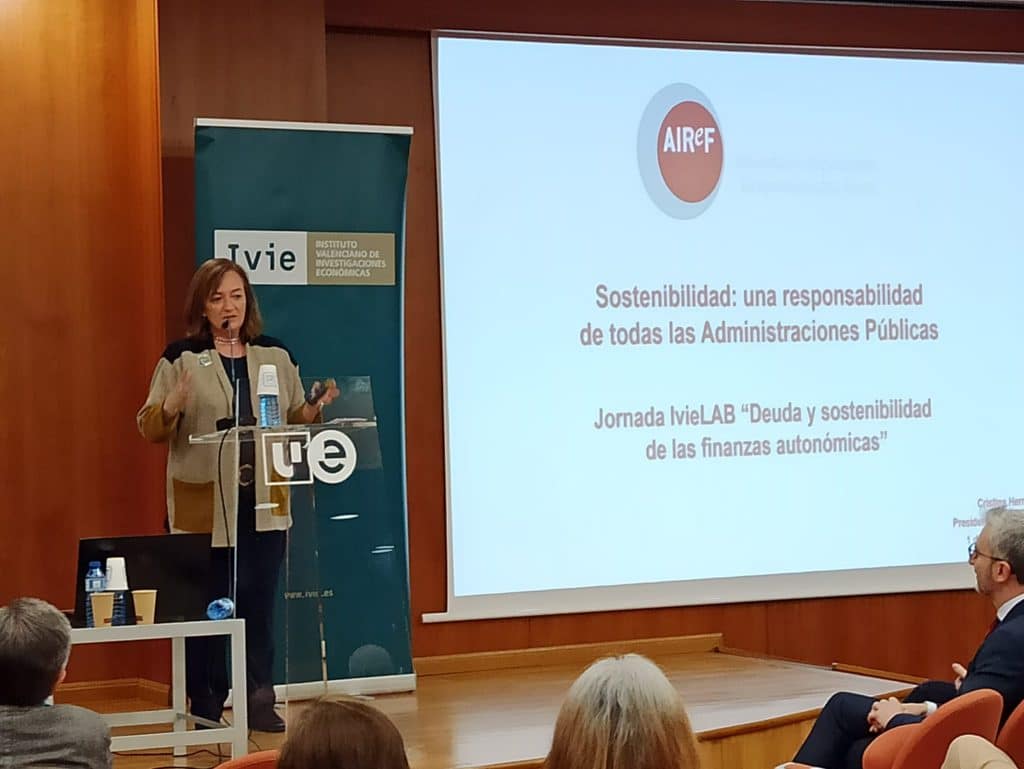
The president of the Independent Authority for Fiscal Responsibility (AIReF), Cristina Herrero, today called for the definition of a comprehensive fiscal strategy to ensure the sustainability of public finances in which all Public Administrations (PAs) must be involved. The president, who took part in the conference ‘Debt and sustainability of regional finances’ organised by IVIE, said that sustainability is a challenge for Spain and, moreover, it will be one of the central axes of the future governance framework of the EU.
Cristina Herrero began her speech by explaining the importance of talking about sustainability in a context such as the current one, which is still uncertain, but in which we are already moving towards economic, institutional, and exogenous restrictions, and in which it will be necessary to generate fiscal space to deal with possible extraordinary sockets. In her opinion, it is time to focus on sustainability given the high level of debt in Spain, which implies risks for growth and a high opportunity cost in the face of interest rate hikes.
As she pointed out at the conference, all public administrations have accumulated historically high levels of debt. The 2008 crisis led to a sharp increase in debt for all public administrations, while the latest crisis has had a major impact about central government and social security, which have absorbed the cost in terms of public debt of the pandemic and the energy crisis.
In this context, the overall situation of public finances requires the involvement of all levels of government, including the RGs, which accumulate high levels of debt and will also be affected by medium-term challenges, such as population ageing. For this reason, a national strategy is needed in which all regional governments participate and a comprehensive reform that addresses, among others, the national fiscal framework, the regional and local financing system, the problems of public debt and is committed to growth.
The national fiscal framework suffers from shortcomings common to the European framework and has its own design and implementation problems, which make it particularly complex due to the decentralised model. According to the president of AIReF, there are elements with room for improvement whether there is European reform and there are two aspects that should be taken special care of: the lack of evidence-based analysis of efficiency, effectiveness and fairness and the shortcomings identified in the budgetary process. In fact, AIReF will be drawing up an Opinion on this matter and will be making proposals to improve the procedure.
A reform of the regional and local financing system will also be necessary, although this will not be enough to solve the problem of sustainability. As Cristina Herrero pointed out, financing is not the only determining factor in the level of spending and compliance with the targets in the Autonomous Regions. Moreover, other reforms will be required to boost growth and contain public debt, given that in the long-term factors have been identified that are conducive to unfavourable debt dynamics (such as the decline in the working-age population or the exhaustion of the favourable cycle of monetary conditions) and an economic outlook that reveals a challenge of real convergence with other neighbouring countries.
In this context, the comprehensive strategy called for by the president of AIReF should not only operate on the public finances of all the public administrations, but also on growth. Thus, the Recovery, Transformation and Resilience Plan (RTRP), which will involve an unprecedented amount of European funds in record time, must play a key role as a catalyst for growth and the structural transformation of the economy, for which more transparency and coordination between the general government sectors is essential.
To conclude, Cristina Herrero insisted that sustainability is emerging as one of the great challenges facing the economy and will also be one of the central axes of the future reform of the European fiscal framework. It is therefore necessary not to delay the definition of a comprehensive strategy, the success of which depends on the involvement and co-responsibility of all public administrations. She pointed out that AIReF’s forthcoming long-term sustainability opinion is along these lines. In her opinion it is necessary to define a baseline scenario that reflects the possible evolution of the economic and fiscal situation in the absence of regulatory changes and reforms with the aim of providing data that will allow debate, disagreement and support decision making.





